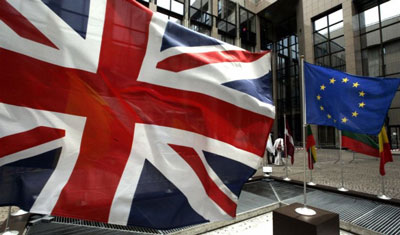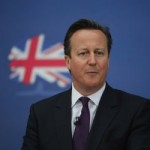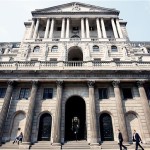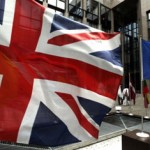Wake Up to U.K. Exit Risks, Banks Tell Investors as Polls Shift

-
Societe Generale sees risk of U.K. leaving EU as high as 45%
-
Europe threatens to overshadow Conservative Party conference
Investors are being urged to tune into the looming political battle over the U.K.’s membership of the European Union amid signs it will prove closer than most now think.
UBS Group AG, Citigroup Inc. and Morgan Stanley are among the banks advising clients to pay more attention to the so-called Brexit debate. They are doing so as opinion polls show diminishing support for staying in the 28-nation bloc even before Prime MinisterDavid Cameron sets a date for the referendum he has promised by the end of 2017.
Citigroup last month raised its probability that voters will choose to withdraw from the EU to as high as 30 percent; Nomura boosted its estimate to 25 percent and Societe Generale SA this week stuck by its 45 percent call. Morgan Stanley said last week that the chance of leaving is not “adequately priced” into U.K. markets.
“People should have it on their radar right now,” said David Tinsley, an economist at UBS in London. “Regardless of your view of Europe, you’d expect some volatility if the possibility of departure increases.”
Long-standing hostilities toward the EU will be on display this week Cameron’s Conservative Party holds its annual conference in Manchester. Europe’s migrant crisis is threatening to fan anti-EU sentiment and there are fresh questions over the opposition Labour Party’s traditional pro-EU stance since Jeremy Corbyn became its leader.
Market Focus
“There will come a point between now and the referendum date when markets will start to focus much more closely on Brexit risks,” Michael Saunders, chief European economist at Citigroup., wrote in a report last month. “A vote for Brexit would threaten the U.K.’s economic and political stability.”

Uncertainty over the vote outcome may prompt gilt traders to discount any prospect of higher interest rates from the Bank of England in the advance of the ballot, according to UBS. Bets on a 2016 rate increase have receded amid mounting evidence that cooling growth in China and emerging markets is starting to weigh on the British and U.S. economies. Sonia forwards are pricing in a two-thirds chance of a 25 basis-point hike by next November. The pound is close to its lowest levels since May against the dollar and the euro.
‘Ugly’ Risks
As the EU debate heats up, the stocks of financial and commercial real estate companies may suffer given they could lose out the most if voters choose to quit the EU, the Swiss bank said in a report last month. At Societe Generale, strategist Kit Juckes lists Brexit among the “big, fat, ugly” outside risks leading him to bet on a weaker pound.
“We’re seeing more and more clients concerned about this,” said Ian Harnett, chief investment officer at Absolute Strategy Research Ltd. “It’s going to be an issue coming through and one that will introduce a degree of uncertainty in U.K. markets.”
Quitting the EU would jeopardize the U.K.’s tariff-free access to 500 million customers — the EU bought almost half of Britain’s exports of goods and services last year — as well as its ability to draw foreign investment and shape continent-wide regulations. Those who want to cut ties say new trade deals could be struck and that the EU swamps businesses with red tape, drains taxpayer money and leaves the U.K. vulnerable to an influx of foreign workers.
Brexit Advantage
The divisions are increasingly reflected in narrowing polls, which may roil markets as they did ahead of 2014’s Scottish referendum. A YouGov survey released last week found 40 percent wanted to leave the EU and 38 percent wanted to stay put, giving the Brexit camp an advantage for the first time in almost a year.
Doubt also surrounds just what Cameron can secure in his efforts to renegotiate the terms of membership and also when the referendum will be held.
While Cameron has pledged to “get the things Britain needs” in his negotiations with other EU leaders, businesses are calling for the vote to be held sooner rather than later to avoid damage to investment. Warning of a 50-50 possibility of Britain opting to leave the EU, the Institute of Directors will say on Tuesday that a referendum in 2017 risks becoming “a chance to whack the political elite” after seven years of Tory rule, instead of a vote on the issues.
Old Wounds
The U.K.’s place in Europe is already reopening old wounds within the Conservatives. Tory lawmakers last month defeated Cameron’s attempt to allow civil servants to work in support of his position in the run-up to the referendum. Former Chancellor of the Exchequer Nigel Lawson said last week he’ll lead a campaign for Britain to leave the EU, arguing that the government won’t succeed in securing the necessary reforms.
A report published Friday by the Open Europe think tank, which examined recent public statements by the Conservative Party’s 330 lawmakers, found that 69 would probably back an exit from the EU, with 203 likely up for grabs. Only 58 seem assured to vote for Britain to remain in the bloc.
While Labour’s conference backed staying in the EU, Corbyn was more skeptical of it prior to his surprise election as Labour leader last month. That makes Philip Rush, an economist at Nomura in London, say Labour’s support for the EU may still weaken.
“Whatever one believes the pros and cons about leaving, we should expect the associated uncertainty to have an impact on investment decisions and capital flows ahead of the event,” said David Owen, chief European financial economist at Jefferies International Ltd.
Source: Bloomberg – Wake Up to U.K. Exit Risks, Banks Tell Investors as Polls Shift





























